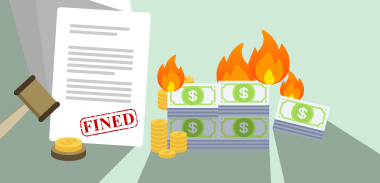Table of Contents

You’ve seen the cookie banners. You’ve clicked “Accept” a thousand times. But what happens when a business *doesn’t* bother with cookie compliance?
Spoiler: it gets expensive. And messy.
Here’s what happens when companies ignore GDPR, ePrivacy, and CCPA rules, complete with real-world case studies and the fines they racked up.
When businesses decide to ignore cookie laws and data privacy regulations like GDPR, ePrivacy, and CCPA, they expose themselves to serious legal and financial risks. These laws have been implemented to protect user privacy and ensure that businesses operate transparently regarding data collection practices. Here’s a breakdown of the consequences, with real-world examples of companies that faced substantial fines for non-compliance.
What Happens If You Ignore Cookie Laws?
1. Financial Penalties
Ignoring cookie laws can lead to hefty fines from regulators. GDPR fines can go as high as €20 million or 4% of global annual turnover (whichever is higher), while the CCPA can fine businesses up to $7,500 per violation.
2. Reputational Damage
A company’s reputation can be severely damaged when it is seen as disregarding user privacy. This damage can lead to a loss of customer trust and long-term revenue declines, as users may seek out more transparent competitors.
3. Legal Consequences
Failure to comply with cookie and privacy laws often leads to legal action, either by regulatory bodies or consumer lawsuits. These cases can result in court orders, mandatory audits, or operational changes that may be difficult or costly to implement.
Real-World Case Studies
1. Google: €50 Million Fine (GDPR)
In January 2019, Google was fined €50 million by the French data protection authority, CNIL, for failing to provide clear and transparent information to users about data processing in accordance with GDPR. The case specifically highlighted the company’s lack of clarity in obtaining valid consent for personalized ads, which violated both the GDPR and ePrivacy Directive.
Key Issues:
- Lack of clear consent for cookies used in personalized ads.
- Insufficient transparency regarding the use of personal data.
2. Facebook: $5 Billion Fine (CCPA and Privacy Violations)
Facebook (now Meta) has faced multiple privacy-related penalties, but the most significant was a $5 billion fine by the Federal Trade Commission (FTC) in 2019. While this was more about broader privacy issues, it underscores the importance of compliance with laws like CCPA, especially when dealing with personal data and tracking users.
Key Issues:
- Data sharing with third-party entities without explicit consent.
- Inadequate security measures for user data.
3. Amazon: €746 Million Fine (GDPR)
In July 2021, the Luxembourg data protection authority (CNPD) slapped Amazon with a fine of €746 million for violating GDPR regulations. The fine was linked to Amazon’s data processing practices, particularly around user consent for data collection through cookies and tracking technologies.
Key Issues:
- Non-compliant cookie banners.
- Inappropriate consent requests related to behavioral tracking.
4. TikTok: $5.7 Million Fine (COPPA/CCPA)
TikTok faced a fine from the Federal Trade Commission (FTC) in 2019 for collecting data from children under 13 without parental consent, violating the Children’s Online Privacy Protection Act (COPPA) and CCPA. This fine was a result of improper data practices, which also included the use of cookies to track users.
Key Issues:
- Data collection without parental consent for children.
- Inadequate privacy protections for minors.
5. British Airways: £183 Million Fine (GDPR)
British Airways was hit with a £183 million fine in 2019 after a data breach affected over 500,000 customers. The breach was largely due to poor cookie practices, where hackers were able to exploit vulnerabilities in the website’s cookie policies to steal personal data.
Key Issues:
- Insufficient cookie security leading to data breaches.
- Failure to inform users of data breaches promptly.
Why You Can’t Afford to Ignore Cookie Laws
- Increasing Enforcement: With regulations becoming stricter globally, enforcement of cookie laws is only going to increase. In 2020 alone, the European Union imposed millions of dollars in fines for GDPR violations.
- Improved Technology: With more advanced tracking technologies like cross-site tracking, cookies can now gather more data than ever. As a result, regulators are more vigilant in ensuring companies are transparent about data collection.
- Privacy-Conscious Consumers: Users are becoming more privacy-aware and may avoid businesses that don’t respect their consent and data rights. As a result, ignoring cookie laws can alienate a significant portion of your audience.
- Increased Class-Action Lawsuits: Many consumers are increasingly willing to file lawsuits against companies that violate their privacy rights. The CCPA, for example, allows consumers to file lawsuits against businesses for violating their data privacy.
The Solution: Stay Compliant, Avoid Fines
To avoid hefty fines and reputational damage, businesses must:
- Implement Clear Consent Mechanisms: Cookie banners must be easy to understand, with users given clear options to accept or reject cookies.
- Conduct Regular Privacy Audits: Ensure that data processing activities, including cookies, are in compliance with the applicable laws.
- Create Transparent Privacy Policies: Users should be able to easily access and understand what data is being collected, how it is used, and with whom it is shared.
- Keep Track of Regulatory Changes: As data privacy regulations evolve, it is important to stay updated on changes to ensure continued compliance.
Conclusion: Protect Your Business and Your Users
Ignoring cookie laws is a risk that no business can afford. Whether it’s hefty fines, a tarnished reputation, or legal repercussions, the consequences can be severe. By ensuring that your business is fully compliant with GDPR, CCPA, and other relevant regulations, you protect not only your company but also your customers’ trust.
Don’t let non-compliance be a costly mistake. Stay informed, stay transparent, and stay compliant.
